- Clone
- S18005H (See other available formats)
- Regulatory Status
- RUO
- Other Names
- FCGR2B, FCgRIIB, FCGR2C, FCRIIC, IGFR2, CD32B, CD32C, FCG2, FCGR2, IGFR2, FcRII-c, CDW32
- Isotype
- Mouse IgG1, κ
- Ave. Rating
- Submit a Review
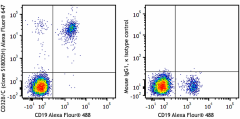
| Cat # | Size | Price | Quantity Check Availability | Save | ||
|---|---|---|---|---|---|---|
| 398305 | 25 tests | 137€ | ||||
| 398306 | 100 tests | 300€ | ||||
CD32B (FCGR2B) and CD32C (FCGR2C) are 40 kDa, type I transmembrane proteins that are members of the Ig superfamily of low-affinity immunoglobulin gamma Fc receptors. CD32B has a cytoplasmic tail that contains an immunoreceptor tyrosine-based inhibition motif (ITIM), while CD32C contains an immunoreceptor tyrosine-based activation motif (ITAM). CD32B and CD32C are low affinity receptor for monomeric IgG but also bind IgG complexes. CD32B and CD32C are expressed on B cells, subsets of monocytes,macrophages and granulocytes, platelets, mast cells, and is a negative regulator of cell activation, proliferation, endocytosis, phagocytosis, and degranulation.
Product DetailsProduct Details
- Verified Reactivity
- Human
- Antibody Type
- Monoclonal
- Host Species
- Mouse
- Immunogen
- Recombinant Human Fc gamma RIIB/C (CD32b/c) Protein
- Formulation
- Phosphate-buffered solution, pH 7.2, containing 0.09% sodium azide and BSA (origin USA)
- Preparation
- The antibody was purified by affinity chromatography and conjugated with Alexa Fluor® 647 under optimal conditions.
- Concentration
- Lot-specific (to obtain lot-specific concentration and expiration, please enter the lot number in our Certificate of Analysis online tool.)
- Storage & Handling
- The antibody solution should be stored undiluted between 2°C and 8°C, and protected from prolonged exposure to light. Do not freeze.
- Application
-
FC - Quality tested
- Recommended Usage
-
Each lot of this antibody is quality control tested by immunofluorescent staining with flow cytometric analysis. For flow cytometric staining, the suggested use of this reagent is 5 µL per million cells in 100 µL staining volume or 5 µL per 100 µL of whole blood. It is recommended that the reagent be titrated for optimal performance for each application.
* Alexa Fluor® 647 has a maximum emission of 668 nm when it is excited at 633 nm / 635 nm.
Alexa Fluor® and Pacific Blue™ are trademarks of Life Technologies Corporation.
View full statement regarding label licenses - Excitation Laser
-
Red Laser (633 nm)
- Application Notes
-
As the extracellular region of CD32B and CD32C are identical, this Ab recognizes both isoforms. Does not crossreact with CD32A.
- RRID
-
AB_2860998 (BioLegend Cat. No. 398305)
AB_2860999 (BioLegend Cat. No. 398306)
Antigen Details
- Structure
- Type I transmembrane protein, 40 kDa, member of the Ig superfamily
- Distribution
-
B cells, subsets of monocytes,macrophages and granulocytes, platelets, mast cells.
- Function
- Negatively regulates cell activation, proliferation, endocytosis, phagocytosis, and degranulation
- Ligand/Receptor
- Fc region of complex or aggregated immunoglobulins gamma
- Cell Type
- B cells, Dendritic cells, Granulocytes, Monocytes, Platelets
- Biology Area
- Immunology, Innate Immunity
- Molecular Family
- CD Molecules, Fc Receptors
- Antigen References
-
- Bruhns P, et al. 2009. Blood. 113: 3716.
- Bewarder N, et al. 1996. Mol Cell Biol. 16: 4735.
- Descours B, et al. 2017. Nature. 543: 564.
- Tomiyama Y, et al. 1992. Blood. 80: 2261.
- Indik Z, et al. 1991. J Clin Invest. 88: 1766.
- Ramsland PA, et al. 2011. J Immunol. 187: 3208.
- Hogarth PM and Pietersz GA. 2012. Nat Rev Drug Discov. 11: 311.
- Bournazos S, et al. 2009. J Immunol. 182: 8026.
- Maxwell KF, et al. 1999. Nat Struct Biol. 6: 437.
- Sandilands GP, et al. 1997. Immunology. 91: 204.
- Ghazizadeh S, et al. 1994. J Biol Chem. 269: 8878.
- Gillis C, et al. 2014. Front Immunol. 5: 254.
- Gene ID
- 2213 View all products for this Gene ID 9103 View all products for this Gene ID
- UniProt
- View information about FCGR2B+OR+FCGR2B on UniProt.org
Related FAQs
Other Formats
View All CD32B/C Reagents Request Custom Conjugation| Description | Clone | Applications |
|---|---|---|
| Purified anti-human CD32B/C | S18005H | FC |
| Alexa Fluor® 647 anti-human CD32B/C | S18005H | FC |
| APC anti-human CD32B/C | S18005H | FC |
| Alexa Fluor® 700 anti-human CD32B/C Antibody | S18005H | FC |
| PerCP/Cyanine5.5 anti-human CD32B/C Antibody | S18005H | FC |
| APC/Cyanine7 anti-human CD32B/C Antibody | S18005H | FC |
| PE/Cyanine7 anti-human CD32B/C Antibody | S18005H | FC |
| PE/Dazzle™ 594 anti-human CD32B/C Antibody | S18005H | FC |
| PE anti-human CD32B/C | S18005H | FC |
| Alexa Fluor® 488 anti-human CD32B/C | S18005H | FC |
| APC/Fire™ 750 anti-human CD32B/C | S18005H | FC |
| FITC anti-human CD32B/C | S18005H | FC |
| Brilliant Violet 421™ anti-human CD32B/C | S18005H | FC |
| TotalSeq™-B1293 anti-human CD32B/C | S18005H | PG |
| TotalSeq™-C1293 anti-human CD32B/C | S18005H | PG |
| TotalSeq™-A1293 anti-human CD32B/C | S18005H | PG |
| PerCP/Fire™ 780 anti-human CD32B/C Antibody | S18005H | FC |
| PerCP/Fire™ 806 anti-human CD32B/C | S18005H | FC |
Customers Also Purchased
Compare Data Across All Formats
This data display is provided for general comparisons between formats.
Your actual data may vary due to variations in samples, target cells, instruments and their settings, staining conditions, and other factors.
If you need assistance with selecting the best format contact our expert technical support team.
-
Purified anti-human CD32B/C

Human peripheral blood lymphocytes were stained with CD19 PE... 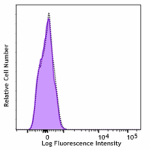
Human CD32A transfected cells were stained with CD32B (clone... 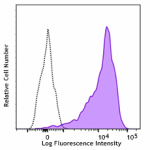
Human CD32B transfected cells were stained with CD32B (clone... -
Alexa Fluor® 647 anti-human CD32B/C

Human peripheral blood lymphocytes were stained with CD19 Al... -
APC anti-human CD32B/C

Human peripheral blood lymphocytes were stained with CD19 Al... -
Alexa Fluor® 700 anti-human CD32B/C Antibody

Human peripheral blood lymphocytes were stained with CD19 FI... -
PerCP/Cyanine5.5 anti-human CD32B/C Antibody

Human peripheral blood lymphocytes were stained with CD19 FI... -
APC/Cyanine7 anti-human CD32B/C Antibody

Human peripheral blood lymphocytes were stained with CD19 FI... -
PE/Cyanine7 anti-human CD32B/C Antibody

Human peripheral blood lymphocytes were stained with CD19 FI... -
PE/Dazzle™ 594 anti-human CD32B/C Antibody

Human peripheral blood lymphocytes were stained with CD19 FI... -
PE anti-human CD32B/C

Human peripheral blood lymphocytes were stained with anti-hu... -
Alexa Fluor® 488 anti-human CD32B/C

Human peripheral blood lymphocytes were stained with anti-hu... -
APC/Fire™ 750 anti-human CD32B/C

Human peripheral blood lymphocytes were stained with anti-hu... -
FITC anti-human CD32B/C

Human peripheral blood lymphocytes were stained with anti-hu... -
Brilliant Violet 421™ anti-human CD32B/C

Human peripheral blood lymphocytes were stained with anti-hu... -
TotalSeq™-B1293 anti-human CD32B/C
-
TotalSeq™-C1293 anti-human CD32B/C
-
TotalSeq™-A1293 anti-human CD32B/C
-
PerCP/Fire™ 780 anti-human CD32B/C Antibody

Human peripheral blood lymphocytes were stained with anti-hu... -
PerCP/Fire™ 806 anti-human CD32B/C

Human peripheral blood lymphocytes were stained with anti-hu...

 Login / Register
Login / Register 











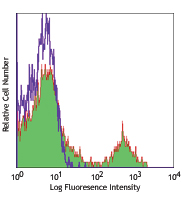
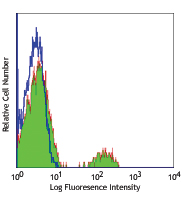
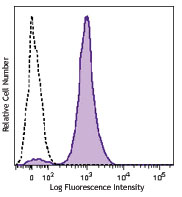
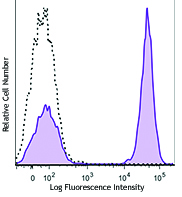






Follow Us